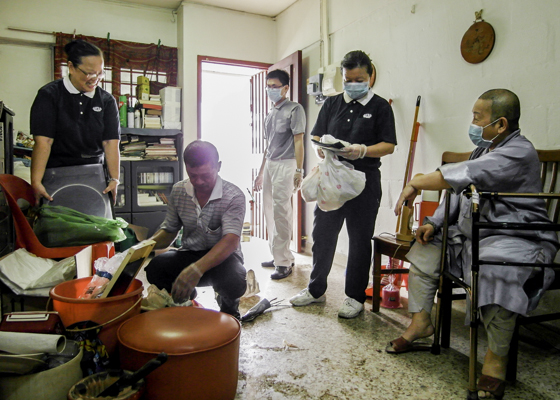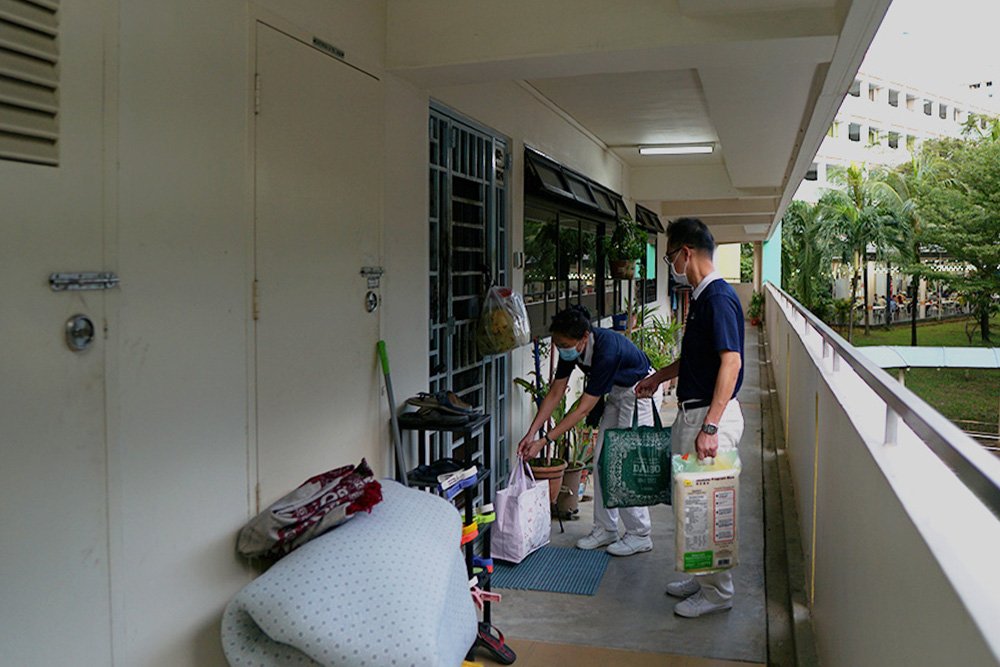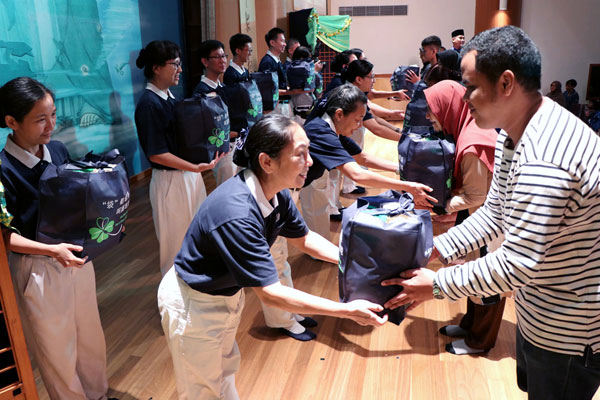On 27th June 2021, Tzu Chi Humanistic Youth Centre kick-started its “Care for Migrant Workers’ Mental Health” project via online live broadcast. (Photo/ Bernard Ng Jia Han)
Try imagining if you were made to live a restricted life of just commuting between work and home, unable to leave your room even on holidays for one and a half years. How do you think such a lifestyle would have impacted our mental and physical health?
Since the COVID-19 outbreak in migrant workers dormitories in March 2020, the movement of approximately 300,000 migrant workers staying in dormitories was highly restricted. Most of the time, they were made to stay put in their dormitories, with the common leisure activities they can partake in being watching movies online, playing online games or chatting with their families through the phone. At the end of October 2021, two months after migrant workers were able to return to work, they were able to spend time in any of the eight Recreation Centres island-wide. Strictly by appointment only, migrant workers were able to take turns to spend up to three hours in the Recreation Centre to engage in services such as hairdressing, shopping, and remittance service. Gradually, some dormitories started to provide facilities for migrant workers within their premises too.
In view of the prolonged period migrant workers spent in their rooms and being away from their families, the Ministry of Manpower (MOM) was highly concerned about the mental health of migrant workers. In November 2020, MOM collaborated with several organisations to set up a taskforce named “Project Dawn” to monitor and improve migrant workers’ mental health.
Similarly, Tzu Chi Humanistic Youth Centre has been looking into the mental wellness of migrant workers since the beginning of the pandemic. The “Stay Home Quilt Community Art Project” was one of the initiatives that aimed to allow migrant workers to ventilate and express themselves through sewing and creating textile art using discarded textiles. Through this collaborative project, Tzu Chi Humanistic Youth Centre got to be acquainted with other migrant worker welfare groups, one of which was the Migrant Writers of Singapore. In April 2021, Tzu Chi Humanistic Youth Centre (HYC) collaborated with the Migrant Writers of Singapore to hold the very first “Mental Health Awareness & Well-Being Festival”. On that day, foreign workers were invited to participate in a variety of activities, whereas the migrant workers staying in dormitories were invited to join along by tuning into the live broadcast.
 Since March 2020, the life of migrant workers living in dormitories consists solely of travelling between workplace and dormitory. The picture shows a migrant worker dormitory located in the North of Singapore. (Photo/ Bernard Ng Jia Han)
Since March 2020, the life of migrant workers living in dormitories consists solely of travelling between workplace and dormitory. The picture shows a migrant worker dormitory located in the North of Singapore. (Photo/ Bernard Ng Jia Han)

On 2nd July 2021, the Ministry of Manpower showed appreciation towards Tzu Chi Humanistic Youth Centre, Migrant Writers of Singapore and other welfare organisations for caring for the mental well-being of migrant workers through its Facebook. (Screenshot by Bernard Ng Jia Han)
An opportunity for collaboration which arises from the COVID-19 surge
A month later, as everyone gradually got used to the new norm of life amid a pandemic, new outbreaks occurred in Tan Tock Seng Hospital and Changi Airport. In view of the more infectious Delta variant of the COVID-19 virus, Singapore entered into Phase 2 Heightened Alert starting from 16th May.
Even though the migrant worker dormitories were relatively safe, preventive measures across the 300 over migrant worker dormitories island-wide were also enhanced for safety reasons. Gyms, gardens and canteens within the dormitories were temporarily closed. No eating was allowed in public spaces and the Recreation Centres were closed.
On 16th May, Tzu Chi Humanistic Youth Centre Manager, Lim Choon Choon, received a call from MOM to invite Tzu Chi Singapore to look into the mental well-being of migrant workers together. The officer from MOM expressed that after the visit to Tzu Chi Humanistic Youth Centre during the Mental Health Awareness & Well-Being Festival two months ago, they have developed a greater understanding of Tzu Chi Singapore’s effort in caring for migrant workers’ mental health. As such, MOM saw Tzu Chi Singapore as not only a suitable partner but also the latter’s potential to create greater impact by working with other migrant worker welfare groups.
Lim Choon Choon went on to contact around ten different organizations* and individuals to collaborate with. Apart from exchanging information, regular meetings were held on every Saturday for brainstorming. Named Project “Care for Migrant Workers’ Mental Health”, it consists of three phases of mental well-being activities that will be conducted according to current COVID-19 safety measures. The first phase being fully in online mode, the second being a mixture of online and offline group activities and the third phase being long-term, collaborative physical group activities.

Even though the Pilate instructor from Bhumi Lifestyle is located in Kuala Lumpur, he still conducts Pilate lessons for the migrant workers living in Singapore dormitories via ZOOM. (Screenshot by Bernard Ng Jia Han)

Online poetry appreciation session organised by Migrant Writers of Singapore drew a fantastic response. (Screenshot by Bernard Ng Jia Han)
Going Live on Facebook for body and mind relaxation
On the Sunday afternoon of 27th June, the first online event commenced with three Facebook live-broadcast activities. A week before the official start of the online event, the “Assurance, Care and Engagement” Group from MOM sent an invitation to more than 1000 migrant worker dormitories (including private dormitories), attracting more than 200 migrant workers to participate in the first online event on that day.
Given the limited mobile data availability of migrant workers, the online activities were conducted in the form of a Facebook live broadcast instead of interactive online mode. To match the work schedule of migrant workers, the Facebook live broadcasts were conducted on Sunday afternoons which were their off-days. As of 25th July, eight sessions of Facebook live broadcasts had already been conducted.
Among the nine sessions of online live broadcasts, two of the online activities were Pilates lessons conducted by Tzu Chi Humanistic Youth Centre’s partner, Bhumi Lifestyle. The Pilate instructor made special adjustments to the Pilate moves to ensure that the Pilate exercise can be easily done on a soft mat while providing the benefits of relaxation. On the other hand, Prof Lim Xiang Jun conducted four online sessions, including awareness talk, meditation, simple body rhythmic moves and tea appreciation to help migrant workers relieve stress and homesickness.
The Migrant Writers of Singapore conducted two online poetry appreciation activities. Apart from literature lovers from Singapore, participants who did their sharing included foreign workers from the Philippines, Indonesia and Bangladesh. These foreign workers often meet-up during weekends to share their love for literature. And so, even with the pandemic, such meet-ups continues in the form of online sessions. Through the promotion by the MOM, they hope to attract more potential literature-enthusiasts too.

Through the “Stay Home Quilt Community Art Project”, Lim Choon Choon had the opportunity to step into migrant worker dormitories and interact with them. Therefore, she got to understand and relate to the situation of migrant workers better. (Photo by Wong Twee Hee)
Prof Lim Xiang Jun mentions that this is the first time she conducts mental well-being talks in the form of an online live broadcast. (Photo by Bernard Ng Jia Han)
Showing concern for migrant workers together and opening the “door” towards the dormitory
In appreciation of the efforts by Tzu Chi Humanistic Youth Centre and the following community partners, MOM posted on its Facebook on 3rd July, stating, “thank you to all our community partners for joining hands with us in improving the well-being of our migrant workers”. At the same time, The Straits Time, Lianhe Zaobao, Central News Agency and English radio station Power 958 went on to report on the collaboration.
Tzu Chi Humanistic Youth Centre Manager, Lim Choon Choon, mentioned, “We hope that through these activities, we will be able to draw the youth and migrant workers closer”. She recalled during the time when they were holding the “Stay Home Quilt Community Art Project”, it took lots of persuasion and communication with the dormitories management for them to be able to enter the migrant worker dormitories to interact with the workers. Today, the collaboration with the MOM has provided much ease for Tzu Chi to step into the dormitories and reach out to the migrant workers.
Having practised medicine for sixteen years, Prof Lim Xiang Jun was also a volunteer doctor at Tzu Chi Free Clinic. She tailored the content of her online talks to better cater to the migrant worker's lifestyle and psychological needs. Having practised both Western and Chinese medicine, meditation, and Ayurveda, Prof Lim Xiang Jun designed exercises that can be done on the dormitory’s bed. She also made use of common objects easily found within the dormitories as props for her lessons. For example, Prof Lim Xiang Jun taught migrant workers how to eat and drink mindfully using tea appreciation for relaxation and calmness.
“They experience a great amount of stress, much more than we can imagine. We should show more concern towards them. They are often a group that is commonly overlooked. Singaporeans should be more understanding and display more care for them.”

On 25th April 2021, the Migrant Writers of Singapore held their first-ever Mental Health Awareness & Well-Being Festival. Tzu Chi Humanistic Youth Centre provided the venue for free to host the event. From left to right: Ngee Soon GRC MP Mr Louis Ng Kok Kwang, Tzu Chi Humanistic Youth Centre Manager Lim Choon Choon, Founder of Migrant Writers of Singapore Mr Zakir Hossain Khokan and Medical Consultant of TIMA Dr Edwin Lim.
 The Mental Health Awareness & Well-Being Festival attracted numerous non-dormitory staying foreign workers to participate, some being domestic helpers while some were expatriats from Southern Asia. (Photo by Chan May Ching)
The Mental Health Awareness & Well-Being Festival attracted numerous non-dormitory staying foreign workers to participate, some being domestic helpers while some were expatriats from Southern Asia. (Photo by Chan May Ching)
Close collaboration through constant adjustment
Founder of the Migrant Writers of Singapore, Mr Zakir Hossain Khokan, expressed that the collaboration with the MOM is a good opportunity as it represents the trust MOM has towards the Migrant Writers of Singapore and Tzu Chi. It also stands to recognize the efforts and achievements made.
Mr Zakir, who came from Bangladesh and works in the IT industry, recognised Tzu Chi as an ideal partner because of Tzu Chi’s ability to empathise and see things from migrant workers’ point of view. He believes mutual understanding from both partners is vital in a partnership and hence the collaboration with Tzu Chi is a highly meaningful one.
Unfortunately, the pandemic situation is highly unpredictable in Singapore. Just when the COVID-19 restrictions were loosened from 14th June, there was a new outbreak from the nightclub community cluster. In view of that, Singapore returned to Phase 2 Heightened Alert from 22nd July till 18th August. Even though migrant workers could still book an appointment to spend time at the Recreation Centres, they had to undergo screening at least two days in advance.
After the online activities ended on 25th July, Tzu Chi and other community partners decided to make adjustments to the rest of the activities in line with the latest COVID-19 safety measures. Apart from the regular literature-related activities organised by the Migrant Writers of Singapore, Tzu Chi Humanistic Youth Centre continues to explore different possibilities to organise activities with other community partners. One example is to invite migrant workers staying in dormitories to capture their daily lives through photography and take part in a photography competition.
*Note: These organizations and individuals include: Bhumi Lifestyle, A Good Space, 24asia.news, Red Pencil Humanitarian Mission, Engineering Good, Migrant Writers of Singapore, One Bag One Book, WIMBY, Sama Sama, Homeforall Migrant, PSSCO, etc.



